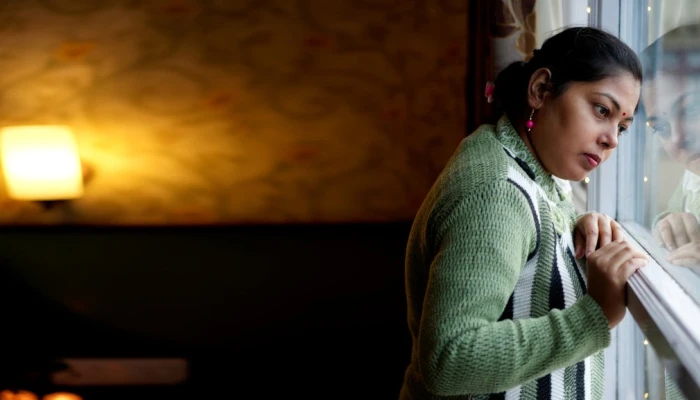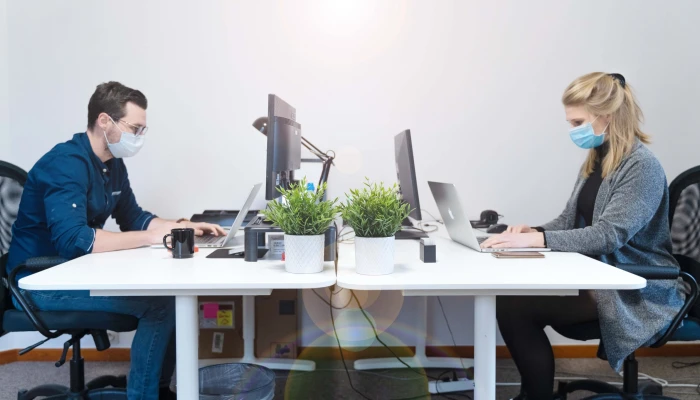Movember during hairy times: how men can maintain mental health amid uncertainty
As focus turns to men’s mental and physical health during Movember, it is important to observe some of the potential challenges men may be facing during the pandemic and to explore ways they can shave off some stress and anxiety, and cope better overall.
For sure, even with the shift to Covid-normal, many of us are still feeling some degree of mental health impact related to the pandemic. Uncertainty is still very present, with the potential for surprises in the way of health findings, variants of concern, work settings and travel restrictions among just some of the things keeping us on high alert and unwilling (or unpermitted) to move about. This can cause us to be in a constant state of anxiety, overwhelm and isolation.
Impacts on men’s health
We know that in Australia men are three times more likely to die by suicide than women.1 Loneliness is significantly associated with depression and suicidality among Australian men, and for many this loneliness was exacerbated during stay-at-home restrictions and has persisted since. Restrictions on travel, both locally and interstate, mean that many have been unable to reconnect with family.
The lack of connection can also mean fewer opportunities to share problems or have help-seeking conversations. Men are far less likely to seek help for mental health conditions than women, with a recent study finding that only a quarter said they would seek help from a mental health professional if they were experiencing personal or emotional problems and 80 percent very unlikely or unlikely to seek help from a phone helpline.2 This makes the role of the friend, colleague or family member even more crucial for men.
Then there is also the impact of job and financial losses and job uncertainty during the period, felt especially hard in cases where the man perceives himself to be the family breadwinner with responsibilities to fulfil.
For some dads, the shift to working from home has seen a welcomed reconnection with family but for others it has been a struggle to manage the stresses of working around family and having to navigate blurred work-life boundaries. Sharing the home-schooling load for example can mean doing work at odd hours which leaves less opportunity for relaxation and self-care.
How can you cope better in response to pandemic uncertainty?
In dealing with any prolonged period of uncertainty and change, the key is to build your psychological flexibility and resilience, and there is a mix of practical and thought-reframing things we can do to enhance this. Read on to learn some ways to prepare yourself to weather future ambiguity.
1: Learn to accept the uncertain situation
Since we quite naturally regard uncertainty as a threat, learning not to strengthen this association is an important step. A way to do this is through acceptance of situations that are uncertain, which can help create new and more helpful associations.
If acceptance doesn’t come easily to you, reflect on times where you successfully tolerated uncertainty, to demonstrate to yourself that uncertainty is a normal part of life and it isn’t something that always results in bad outcomes.3
Acceptance helps the unpleasant emotions and difficult thoughts about uncertainty subside, so that you are freed up to think about your next steps. Then, brainstorm what you can do to experience joy in the midst of uncertain circumstances, and focus on carrying out these things.4-8
2: Recognise when you need support for your mental health
Most of us find uncertainty difficult to deal with. If you find you’re really struggling with it, or are behaving differently toward others when situations get tense and stressful (e.g. taking your frustrations out on a partner or family member), it is a good idea to seek a mental health professional early so they can assist you in developing the skills to cope well when an uncertain situation arises again.
3: Planning your week #1: schedule something out of your comfort zone
Challenge yourself to do things that feel risky or unfamiliar. What you’re doing is flexing your ability to cope with ambiguity and your confidence in facing uncertainty.9,10 First, compile a list of ambiguous situations and note down the things you do to feel more certain in the midst of these. For example, it might be seeking reassurance from others or excessively double-checking that you’re making the right decision to rent an apartment or send an email.
Aim to place yourself in one of these situations each week, reflecting on how it went by writing or voice-recording the good, the bad and any other observations you had about the experience. Psychologists at the University of Michigan have developed some helpful steps here to complete this exercise.
4: Planning your week #2: block out time to spend with others
In his research, psychologist Dr John Gottman found that for every negative interaction during conflict, a stable and happy relationship has five (or more) positive interactions. This 5:1 ratio can be used as a guide and gauge for your own relationships with loved ones. Are you having more negative interactions with the person? What can you do to change that?
For example, you may discover that you need to be more deliberate in planning enjoyable things to do together with the people you live with, and prioritise doing these so they don’t fall by the wayside. Or maybe you need to find out what makes them feel loved and appreciated, and go out of your way to do these things for them.11
5: Role-model good communication in the home
As simple as it sounds, if you live with a partner or family, one conversation can really set the tone and change everything for everyone, just as it can in the workplace. Try promoting a harmoniously stress-free household by practising empathetic, active listening. This includes giving the other person time to pause and think in silence, and repeating back what you’ve heard in your own words without judgment.12 Find something to be grateful for that you can mention in conversations, perhaps focusing on doing this at the start or end of the day as a habit-forming exercise.
6: Sneak some mindfulness into your day
It can be the simplest task within the most repetitive of days, but there is always opportunity to blend in some mindfulness by tuning into your breathing, your physical sensations and your surroundings. Mindfulness is not about going into a trance, nor is it even about being completely calm with an empty mind. It is simply about observing what is and accepting how things are. While as little as a 30-second pause each day is believed by some experts to have benefit,13 you can also practise mindfulness while eating or going for a walk in nature – these daily activities can be done mindfully. Exercised regularly, it can develop a flexibility of thinking that enables you to participate and engage more fully and thoughtfully with others and with life, which can also mean greater control over your reactions to life’s stresses. Mindfulness is an important tool for enhancing psychological flexibility and can be useful in assisting our ability to cope with change.
En Masse offers a Men's Health workshop/webinar that provides some practical tips and insights for men, along with Mental health in uncertain times which covers how to cope with pandemic-related anxiety among other impacts. Talk to us today about a program tailored to your audience.
Support options if you or someone you know needs help
- Lifeline (24-hour Crisis Line): 131 114
- Suicide Call Back Service (24-hour Crisis Line): 1300 659 467
- MensLine: 1300 789 978
- Men's Referral Service (for men seeking to address family violence): 1300 766 491
- Relationships Australia: 1300 364 277
References
- Australian Bureau of Statistics (2020). Causes of Death, Australia, 2019: Intentional self-harm (suicide), Catalogue No 3303.0. Retrieved 23 October 2020.
- Bandara D, Howell L, Daraganova G (2019). Ten to Men: The Australian Longitudinal Study on Male Health, Release 2.1 (Waves 1-2). ADA Dataverse. http://dx.doi.org/10.26193/V2IVIG
- Government of Western Australia. Accepting Uncertainty. Center for Clinical Interventions, 2015. Available from: https://www.cci.health.wa.gov.au/~/media/CCI/Consumer%20Modules/What%20Me%20Worry/What%20Me%20Worry%20-%2009%20-%20Accepting%20Uncertainty.pdf
- University of California, Berkeley. Seven Ways to Cope with Uncertainty. The Greater Good Science Center, 2020. Available from: https://greatergood.berkeley.edu/article/item/seven_ways_to_cope_with_uncertainty
- Hagan TL, Fishbein JN, Nipp RD, et al. Coping in Patients With Incurable Lung and Gastrointestinal Cancers: A Validation Study of the Brief COPE. J Pain Symptom Manage. 2017;53(1):131-138.
- University of Michigan. Coping with Uncertainty. Counseling and Psychological Services, 2021. Available from: https://caps.umich.edu/article/coping-uncertainty
- Rettie H, Daniels J. Coping and tolerance of uncertainty: Predictors and mediators of mental health during the COVID-19 pandemic. Am Psychol. 2021;76(3):427-437.
- Psychology Tools. Intolerance Of Uncertainty: Help Your Clients To Embrace The Unknown Using Behavioral Experiments. Psychology Tools, 2021. Available from: https://www.psychologytools.com/articles/intolerance-of-uncertainty-help-your-clients-to-embrace-the-unknown-using-behavioral-experiments/
- American Psychological Association.The great unknown: 10 tips for dealing with the stress of uncertainty. American Psychological Association, 2020. Available from: https://www.apa.org/topics/stress/uncertainty
- University of Michigan. Building Your Tolerance for Uncertainty: Act “As If”. Counseling and Psychological Services, 2021. Available from: https://caps.umich.edu/content/building-your-tolerance-uncertainty-act-%E2%80%9C-if%E2%80%9D
- Relationships Australia Queensland. How to Survive Self-Isolation with Your Family. Relationships Australia Queensland, 2021. Available from: https://www.raq.org.au/blog/how-survive-self-isolation-your-family
- Mental Health Foundation. Nurturing our relationships during the coronavirus pandemic. Mental Health Foundation, 2021. Available from: https://www.mentalhealth.org.uk/coronavirus/nurturing-our-relationships-during-coronavirus-pandemic
- Melbourne Child Psychology & School Psychology Services, Port Melbourne. Mindful Pauses — How 30 Seconds of Meditation Can Help to Relieve Anxiety [viewed 24 November 2021 at [https://www.melbournechildpsychology.com.au/blog/mindful-pauses-how-30-seconds-of-meditation-can-help-to-relieve-anxiety/\]](https://www.melbournechildpsychology.com.au/blog/mindful-pauses-how-30-seconds-of-meditation-can-help-to-relieve-anxiety/])


